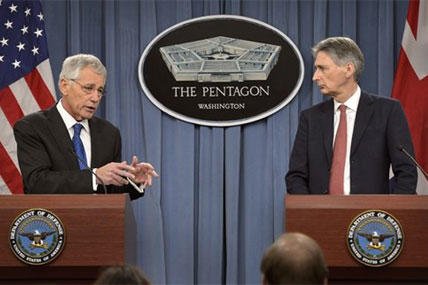The U.S. and British defense chiefs agreed Wednesday on the need for bolstering missile defense systems in Eastern Europe while stressing that the planned NATO shield was not aimed at Russia.
Despite the disclaimer, Defense Secretary Chuck Hagel said "our main focus today was Ukraine," following discussions with British Defense Minister Philip Hammond.
At a Pentagon briefing, Hammond said the talks were "dominated' by the crisis in Ukraine and ways "to force President [Vladimir] Putin to stop his bullying behavior."
Both Hagel and Hammond said they were seeking to speed up the timeline for the placement of NATO missile defense systems in Poland, which were to be operational by 2018.
Hammond said the "missile defense program is not aimed at Russia" but at "rogue states" such as Iran.
"It's not a counter-Russia policy," Hammond said. "They know what it's aimed at and it isn't aimed at them."
The planned European Interceptor Site for 10 missile silos in Poland was designed to work in conjunction with U.S. midcourse tracking radar in the Czech Republic.
The NATO site in Poland was separate from Poland's efforts to develop its own missile defense shield, which was designed to protect against Russia.
At a meeting in Warsaw on Jan. 30, Hagel also offered U.S. assistance to Poland for the development of its missile defense system apart from NATO's.
"As Poland explores its options for its own missile defense capabilities, there is an unmistakable opportunity for us to forge even closer cooperation in this area, leveraging cutting-edge technology and enhanced NATO capability," Hagel told Polish Defense Minister Tomasz Siemoniak.
"This will benefit Poland, the United States and the entire trans-Atlantic alliance," Hagel said.
Both Hagel and Hammond said the allies would not recognize the Russian takeover of Crimea. Instead, their main concern now was the buildup of an estimated 30,000 Russian troops on the borders of eastern Ukraine.
Hagel said that he had spoken by phone with Russian Defense Minister Sergei Shoygu last week and "I asked him specifically why the Russians were building up."
"He told me specifically that they had no intention of crossing the border into Ukraine," Hagel said. "But the reality is that they continue to build up their forces."
Hagel said that the U.S. was still reviewing Ukraine's urgent request for military assistance. He said that 25,000 cases of Meals Ready to Eat (MREs) were on their way to Ukraine and the U.S. was likely to approve other non-lethal assistance.
No decisions have been made on shipments of small arms and communications gear to Ukraine that have been advocated by several members of Congress, Hagel said. However, President Obama said Wednesday in a speech in Belgium that "we are prepared to do more."
Both Hagel and Hammond said that the U.S. and Britain were also considering shoring up the air defenses of NATO allies in the Baltic states and Poland beyond the assets that were sent earlier this month.
The U.S. has already sent sent F-15 fighters from England to Lithuania for air patrols over the Baltic states, and F-16 fighters and about 150 ground maintenance personnel to Poland over the objections from Russia. Britain has sent several Typhoon fighters.
-- Richard Sisk can be reached at richard.sisk@monster.com





























